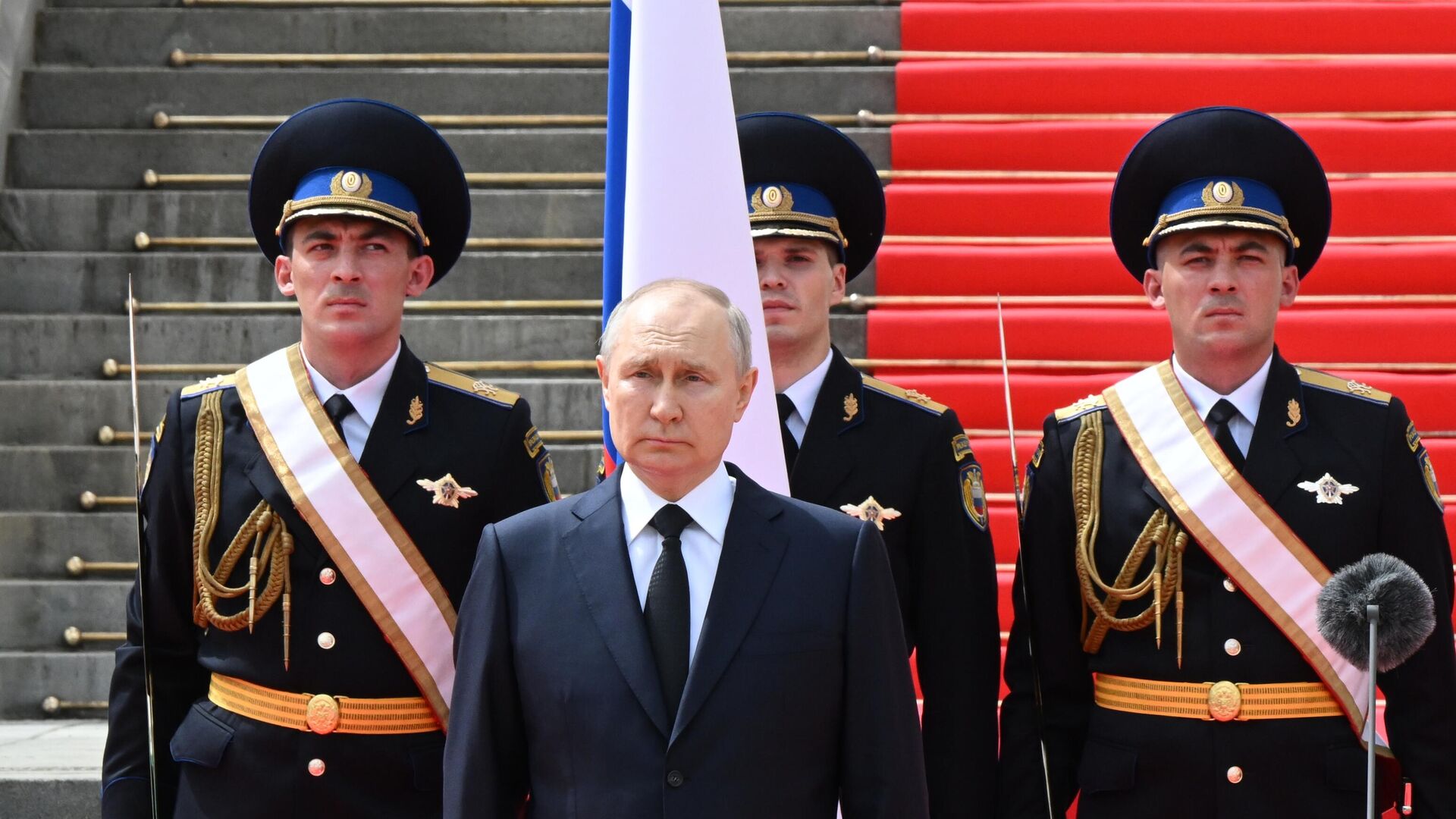Vladimir Putin thanked all personnel of the Russian Armed Forces, as well as the country’s law enforcement agencies and special services for their courage and loyalty to the Russian people.

Military units who took part in the suppression of the attempted armed mutiny on June 24, actually stopped a civil war in Russia, and acted clearly and harmoniously, Russian President Vladimir Putin said on Tuesday.
“You defended the constitutional order, and our citizens’ lives, security and freedom. You saved our motherland from turmoil, and in fact prevented civil war. In these difficult moments, you acted clearly and harmoniously; through your deeds, you proved your loyalty to the people of Russia and the military oath,” Putin said, addressing the security forces who quashed the insurrection.
The Russian president stressed that “today the historic Cathedral Square of the Moscow Kremlin sees servicemen of the Russian Armed Forces, and the Russian Guard, as well as the staff of the Russian National Guard, the FSB, the Interior Ministry, the Federal Protective Service as well as soldiers and officers, who are the real defenders of the Fatherland, and who – at a tough time for the country, along with their comrades – stood in the way of turmoil, the result of which could have inevitably been chaos.”
Putin thanked the personnel of the country’s armed forces, law enforcement agencies and special services for their “courage, valor and loyalty to the people of Russia.”
He said that the people who were sucked into the Wagner mutiny realized the fact the army and the people were not on the side of the rebels.
“The quick and precise deployment of law enforcement agencies made it possible to stop the extremely dangerous development of the situation in the country, something that helped prevent civilian casualties,” Putin emphasized.
The Russian head of state underlined that the determination and courage of the servicemen, as well as “the consolidation of Russian society played a huge and decisive role in stabilizing the situation.”
Putin also paid his respects to the military pilots who were killed while trying to take on the mutineers. “Our comrades-in-arms, pilots, died in the confrontation with the mutineers. They had no fear and honorably fulfilled the order and their military duty,” he said. Putin asked for a minute of silence so his audience could pay their respects to the pilots.
According to him, relocating Russian troops from the special military operation zone to grapple with Wagner’s aborted mutiny gamble was not necessary.
“Units of the Defense Ministry, the National Guard as well as the forces of the Ministry of Internal Affairs and special services ensured the reliable operation of the most important control and strategic centers, the security of border regions, and the strength of the rear of our Armed Forces of all military formations, which continued at that time to heroically fight at the front. We did not have to remove combat units from the special military operation zone,” the Russian president pointed out.
Wagner’s Aborted Mutiny Plot
On Friday, PMC Wagner boss Yevgeny Prigozhin accused the Russian military of conducting a strike against a Wagner camp, even though the country’s Ministry of Defense denied his allegations.
Shortly after, the PMC chief announced that the council of Wagner commanders had made the decision to “stop” the “evil” being “carried by the military leadership of the country,” warning that he and his 25,000 men would go to Moscow to “sort out” what happened to their comrades killed in the missile attack. The Russian Federal Security Service (FSB) opened a criminal case against Prigozhin for inciting armed mutiny.
The Defense Ministry in turn said in a statement at the time that “all messages and videos distributed on social media on behalf of Prigozhin about alleged ‘strikes by the Russian Defense Ministry on rear camps of PMC Wagner’ do not correspond to reality and are an informational provocation.”
In the early hours of Saturday, a contingent of Wagner forces seized control of several administrative buildings in the southern Russian city of Rostov-on-Don and kicked off an advance on Moscow to “sort out” the Russian Defense Ministry’s top brass over what Prigozhin described as a purported missile attack on Wagner positions.
In the June 24 televised address to the nation, Putin described the actions of PMC Wagner as an armed mutiny and treason, pledging tough measures against the insurgents.
Also on Saturday, Belarus’ Security Council issued a statement expressing concerns about the situation involving Prigozhin and his conflict with the Russian military’s leadership, warning that “any provocation” would prove a “gift to the collective West” and stressing that Minsk was and will always remain Russia’s ally.
The situation finally de-escalated later on Saturday, when Minsk said that Prigozhin had accepted Belarusian President Alexander Lukashenko’s proposal to stop the movement of Wagner troops in Russia.
Belarusian media cited the presidential press office that the Wagner chief had agreed during negotiations mediated by Lukashenko that “unleashing a bloody massacre on Russian territory” would be “inadmissible.”
Kremlin spokesman Dmitry Peskov then told reporters that the criminal case against Prigozhin would be lifted and that he would leave for Belarus under guarantees given by Putin.
By Oleg Burunov
Published by Sputnik Globe
Republished by The 21st Century
The views expressed in this article are solely those of the author and do not necessarily reflect the opinions of 21cir.com
